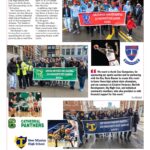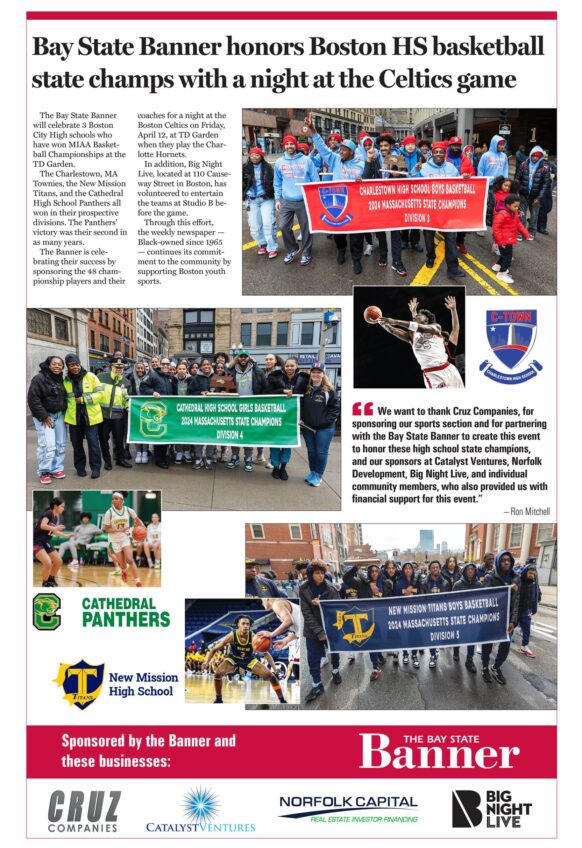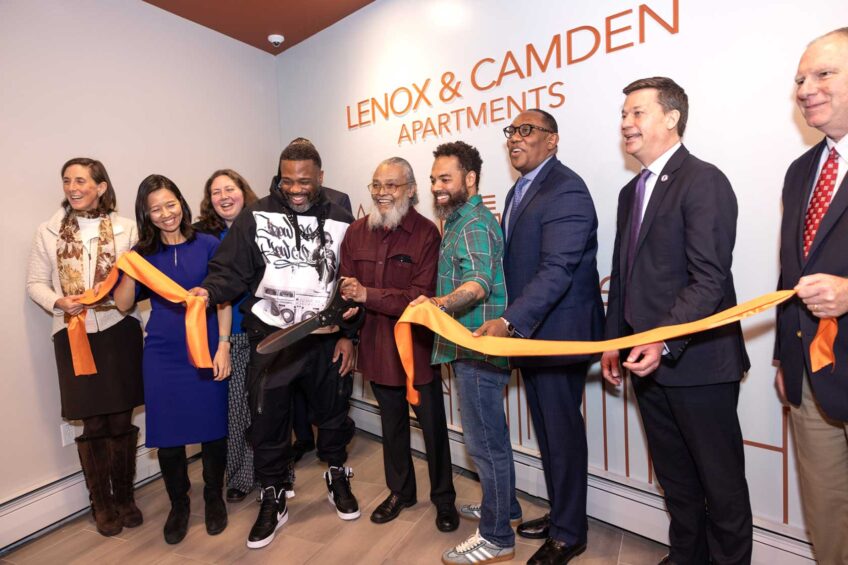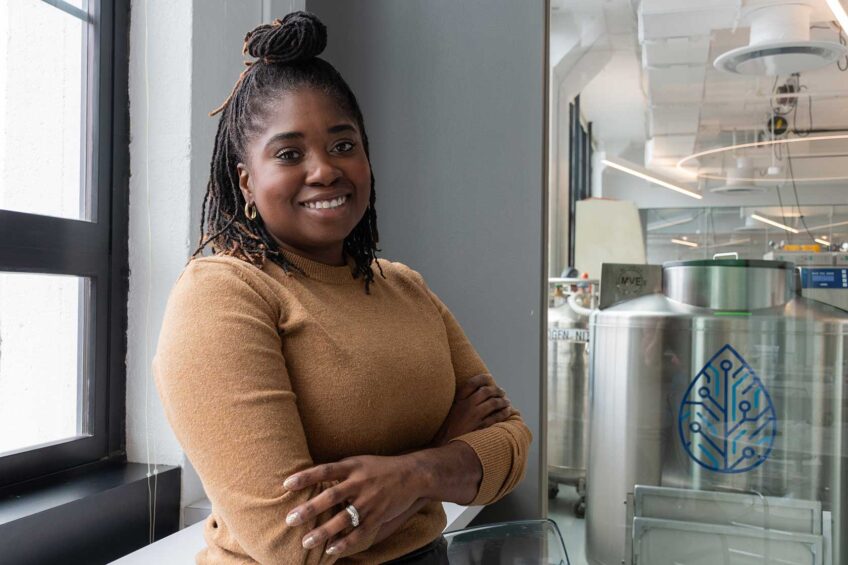Workers ‘Fight for $15’ in Downtown Boston
Hundreds march for higher wages, unions and more
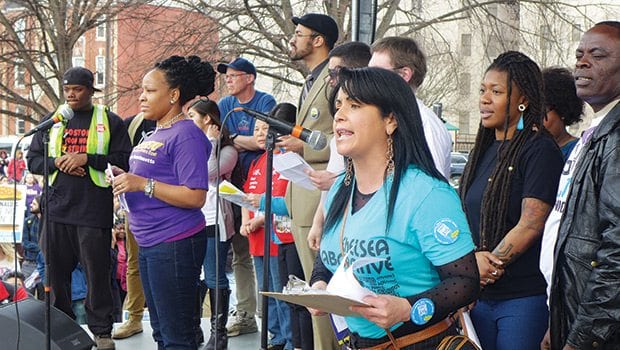
Labor activists across the country took to the streets last week in coordinated marches calling for higher wages, many times weaving their message into broader calls for unionization, affordable housing, and immigration reform.
Those marching in a Boston demonstration underscored the difficulty of trying to make ends meet on a limited pay check.
Kenneth Brimmage, a Burger King employee who currently earns $9 an hour, said he had to factor heavy travel costs into his limited budget. He’s originally from Boston but said he was priced out of the city and now lives in Brockton — and travels to Holbrook every day to work. Despite having to travel far for the rally, he said it was worth it.
“A chance for a better tomorrow is always worth everything you got,” he said.
Sabrina Johnson of Dorchester, a member of Boston Fast Food Workers, said she had to work three jobs to make ends meet. She makes $9.57 per hour at Chipotle, $10 at Logan airport, and $13.39 as a home health aid. She marched in front of the crowd helping to hold a large banner for the Boston Fast Food Workers group.

Veronica Turner of 1199SEIU leads marchers down Boylston Street.
The Boston march, organized by a local group called the #WageAction Coalition (yes, hashtag included), framed itself as the kickoff for a global series of marches and protests on April 15. In the United States, the national movement is known as the Fight for Fifteen, named after its call for a $15 minimum wage — at either the city- or industry-level, depending on the location — from Seattle to New York. Boston organizers decided to march on April 14 in part out of respect for the anniversary of the 2013 Boston Marathon bombing the following day.
Multiple parties
Last week’s march included workers from a diverse range of low-paying jobs, including fast-food workers, home health care aides, taxi drivers, airport security and luggage workers, and adjunct professors.
While the inclusion of this last group may seem surprising to some due to their high level of education, organizers stress that adjunct professors often live at near-poverty levels and make very low levels of pay compared to their tenured colleagues for the amount of hours that they end up working.
As the march wound through the heart of the city’s hospitality and dining districts, some employees in hotel and restaurant uniforms came out to watch. When asked by the Banner for comment, multiple workers declined because they were on the job and not supposed to speak to press.
One onlooker, however, lent his support from his parked pickup truck. Ron Talbot, a carpenter with Local 51 in Dorchester, said that while he was satisfied with his own level of income, he wished the best to protesters.
“We always like to see people marching peacefully,” he said. “If they need to make more money, then good for them.”
Although the signs and chants of the event mostly centered around the call for a $15 hourly wage, at times the labor message mixed heavily with other concerns that community organizers and working-class Bostonians frequently raise.
“Up with wages, down with rents! Chinatown is not for sale!” shouted Chinese Progressive Association organizing director Karen Chen while the large crowd paused at the intersection of Essex and Washington streets. CPA has been vocally opposed to the ongoing development of the neighborhood, which has seen a large uptick in luxury development and a subsequent skyrocket in rents. Data from the 2008 American Community Survey — the most recent available — showed that 59 percent of Chinatown resident households had a total income of less than $25,000. Yet the median price for luxury units in Boston’s central neighborhoods is now $1.4 million, according to a LINK Boston analysis cited in a recent Boston Globe article.
Broad agenda
Another speaker with Right to the City Coalition took to the stage to bring attention to housing issues.
“It’s time to end ‘no fault’ evictions, it’s time to end housing discrimination against people with felony records, it’s time to end skyrocketing rents,” he said, highlighting three issues that affordable housing advocates frequently invoke.
Immigration issues also factored into some protesters’ messages, reflecting the large immigrant make-up of certain labor groups there.
“We want the exploitation to stop, especially for the workers that are undocumented,” one protester said in Spanish while addressing the crowd where it first gathered at Forsyth Park.
Organizers also used the march to highlight several site-specific worker issues beyond the call for higher wages: a demand from healthcare workers at Tufts Medical Center for a commitment to free and fair union elections as part of the hospital’s merger talks with Boston Medical Center; complaints about a switch from a union contractor to a non-union contractor overseeing janitors at an office building located at 31 James Street; and charges that a cleaning company subcontracted by AMC Loews owes workers a total of $24,000 in back-pay for violations of unpaid overtime work.
City Councilor Tito Jackson stopped by the march as it worked its way past the Prudential Center. He led a loud call-and-response chant as marchers passed by, shouting “Show them what democracy looks like!” to people who responded, “This is what democracy looks like!”
“I’m here to stand with the lowest-paid workers in our communities – the folks who don’t have lobbyists,” he told the Banner.
While the strategy of the #WageAction Coalition in Boston thus far has been industry-specific and not specifically aimed at a city-wide $15 minimum wage, Jackson said he was in favor of such a standard across the board.
Other specific legislative fixes called for by organizers included a Senator Dan Wolf bill to increase pay at fast food chains to $15 and the end of a sub-minimum wage for restaurant servers. The latter group currently makes $3 per hour with the assumption that customers will subsidize the rest of their wages with tips.

